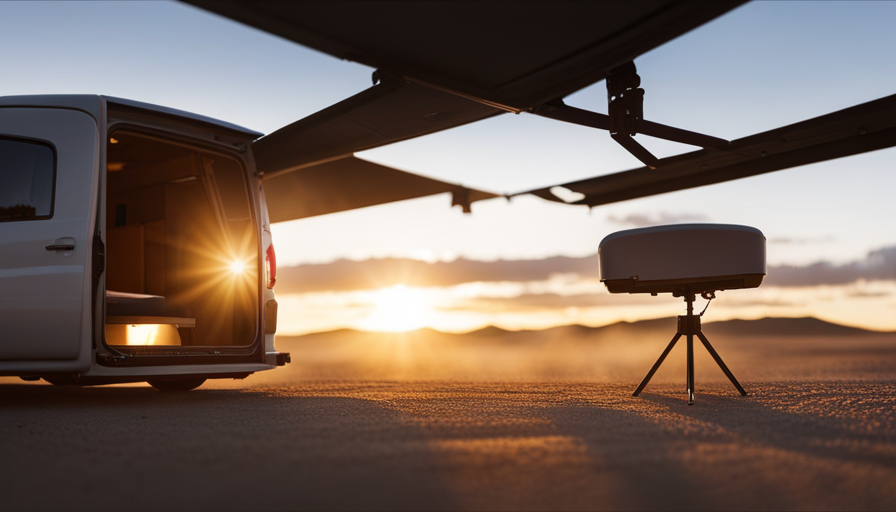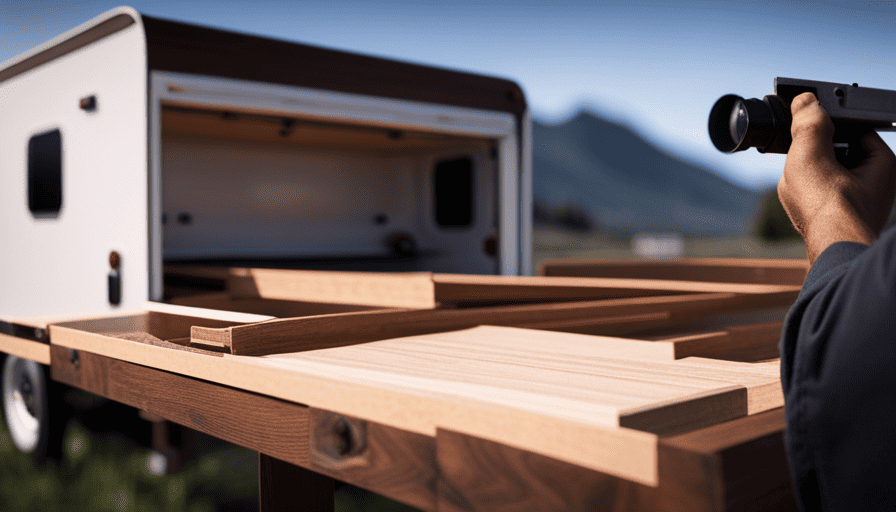Remember the days when unplugging and enjoying nature was common practice? Unfortunately, those days are now a thing of the past, my friends. In today’s fast-paced, technology-driven world, staying connected has become almost essential, especially when camping in the great outdoors.
So, how can I get WiFi in my camper, you ask? Fear not, fellow adventurers, for I have the answers you seek. In this article, I will guide you through the various options available to ensure you never have to miss that important email or binge-watch session again.
From researching wireless internet providers to investing in portable satellite systems, we will explore all the options that will keep you connected no matter where your wanderlust takes you.
So, grab your marshmallows, pitch that tent, and let’s dive into the wonderful world of camper WiFi!
Key Takeaways
- Research wireless internet providers catering to RVers and compare internet speeds and coverage areas of different providers.
- Install a mobile hotspot device for a WiFi network in your camper, considering dedicated mobile hotspots, smartphone hotspots, vehicle WiFi, or prepaid hotspot plans.
- Consider using a portable satellite internet system for reliable connectivity in remote areas, although it may be more expensive and slower.
- Set up a WiFi antenna and router in your camper to create a personal network, and consider using a WiFi signal booster or repeater to extend range and improve signal strength.
Research Wireless Internet Providers
You’ll need to research wireless internet providers if you want to stay connected in your camper and truly embrace the freedom of the open road. Luckily, there are many wireless internet options available that cater specifically to RVers.
The first step is to compare internet speeds offered by different providers. Some providers offer 4G LTE connectivity, while others may provide 3G or even satellite internet. It’s important to consider the coverage areas as well, as you’ll want a provider that has coverage in the areas you plan to travel.
When comparing internet speeds, take into account your specific needs. If you’ll be using the internet mainly for browsing and checking emails, a lower speed plan may be sufficient. However, if you plan on streaming movies or working remotely, you’ll want a plan with higher speeds to ensure a smooth and uninterrupted connection.
Once you’ve done your research and selected a wireless internet provider that meets your needs, you can move on to the next step: installing a mobile hotspot device. This device will allow you to create a Wi-Fi network in your camper, using the provider’s cellular network to connect to the internet. With a mobile hotspot, you’ll have the freedom to stay connected wherever your travels take you.
Install a Mobile Hotspot Device
To ensure a reliable internet connection on the road, consider equipping your camper with a mobile hotspot device, like a pocket-sized router that acts as a Wi-Fi hub.
Here are some key mobile hotspot options to consider:
-
Dedicated Mobile Hotspot: These devices are specifically designed to provide internet access on the go. They offer fast speeds and are compatible with multiple devices.
-
Smartphone Hotspot: Most smartphones have a built-in feature that allows you to create a Wi-Fi hotspot. However, keep in mind that using your phone as a hotspot can drain its battery quickly.
-
Vehicle Wi-Fi: Some car manufacturers offer built-in Wi-Fi capabilities in their vehicles. This option eliminates the need for an external device and provides a seamless internet connection.
-
Prepaid Hotspot Plans: If you don’t want to commit to a long-term contract, consider a prepaid hotspot plan. These plans allow you to pay for the data you need without any long-term commitment.
When using a mobile hotspot, it’s important to troubleshoot common issues that may arise. These can include slow speeds, connection drops, or difficulty connecting multiple devices. By following the troubleshooting steps provided by your hotspot device or contacting customer support, you can quickly resolve these issues.
To extend your Wi-Fi range and improve signal strength, the next step is to use a Wi-Fi extender or booster.
Use a WiFi Extender or Booster
Enhance your internet reach and amplify your signal strength by adding a WiFi extender or booster. It’s like a magical wand that brings the power of connectivity to every corner of your mobile oasis.
Setting up a WiFi extender is a straightforward process that can greatly improve your camper’s WiFi capabilities. First, find a suitable location for the extender, preferably near the center of your camper to ensure optimal coverage. Next, connect the extender to your existing WiFi network by following the manufacturer’s instructions. Once connected, the extender will boost the signal and extend its range, allowing you to enjoy a stronger and more reliable connection throughout your camper.
Using a WiFi booster offers several benefits. Firstly, it eliminates dead spots where the WiFi signal is weak or nonexistent, ensuring that you can stay connected no matter where you are in your camper. Additionally, a booster can improve the speed and stability of your internet connection, allowing for smoother streaming, faster downloads, and seamless online gaming. With a WiFi extender, you can create your own personal WiFi hotspot and enjoy the convenience of having reliable internet access wherever you go.
Now that you’ve enhanced your camper’s WiFi capabilities, let’s explore another option to further expand your internet access: utilizing campground WiFi.
Utilize Campground WiFi
Make the most of your outdoor adventure by taking advantage of the convenient and reliable campground WiFi, allowing you to effortlessly connect your devices and stay connected with the world while enjoying the breathtaking views and serene surroundings. When utilizing the campground WiFi, there are a few tips to maximize your experience and troubleshoot any connectivity issues.
-
Position your camper close to the WiFi source: To ensure a strong signal, park your camper as close as possible to the WiFi access point or router.
-
Use a WiFi booster or extender: If you’re parked farther away from the WiFi source, invest in a WiFi booster or extender to amplify the signal and improve connectivity.
-
Avoid peak usage times: Campground WiFi can become slower during peak hours when more campers are online. Try to use it during off-peak times for better speeds.
-
Clear obstructions: Keep in mind that physical obstructions like trees or buildings can weaken the WiFi signal. Position your camper in a clear line of sight to the access point.
-
Contact campground staff for assistance: If you’re experiencing persistent connectivity issues, don’t hesitate to reach out to the campground staff for troubleshooting help.
By maximizing campground WiFi and troubleshooting any connectivity issues, you can ensure a seamless online experience during your outdoor adventure.
Transitioning into the next section, investing in a portable satellite internet system can provide even more reliable connectivity in remote areas.
Invest in a Portable Satellite Internet System
Immerse yourself in the digital wilderness with a portable satellite internet system, your ticket to uninterrupted connectivity amidst remote landscapes. When it comes to getting WiFi in your camper, there are different options available. While traditional internet providers may not be accessible in remote areas, a portable satellite internet system offers a reliable solution.
Portable satellite internet uses a satellite dish to connect to the internet, allowing you to access WiFi even in the most secluded camping spots. Unlike traditional internet providers, which require a fixed location, a portable satellite internet system can be easily set up wherever you go. This means you can stay connected while exploring off-grid locations or camping in areas with limited infrastructure.
There are pros and cons to consider when opting for a portable satellite internet system. On the positive side, it provides reliable internet access in remote areas, ensuring you can stay connected with family and friends or even work remotely. However, portable satellite internet systems can be more expensive than traditional providers, and the speed may not always be as fast.
Now that you understand the benefits and drawbacks of a portable satellite internet system, let’s explore the next option: setting up a WiFi antenna and router.
Set Up a WiFi Antenna and Router
Now that we’ve discussed investing in a portable satellite internet system, let’s explore another option for getting WiFi in your camper. One effective solution is to set up a WiFi antenna and router. This method allows you to connect to nearby WiFi signals and create a personal network inside your camper.
To start, you’ll need to install a WiFi antenna on the exterior of your camper. This antenna will help you capture WiFi signals from nearby sources, such as campgrounds or cafes. Once the antenna is in place, you’ll need to configure your router to connect to the captured signals and create a secure network inside your camper.
Here are four key steps to follow when setting up a WiFi antenna and router:
- Choose a high-gain WiFi antenna suitable for outdoor installation.nn2. Mount the antenna on the roof or side of your camper for optimal signal reception.nn3. Connect the antenna to your router using a coaxial cable.nn4. Configure the router’s settings to connect to nearby WiFi networks and create a dedicated network for your camper.
By following these steps, you can enjoy a reliable and secure WiFi connection inside your camper. However, if you’re still experiencing weak signals, consider a WiFi signal booster or repeater to extend your network’s range and improve connectivity.
Consider a WiFi Signal Booster or Repeater
Enhance your internet connection in your mobile home with a WiFi signal booster or repeater. When you’re on the road, a weak WiFi signal can be frustrating. A WiFi signal booster or repeater can help extend the range and improve the strength of your WiFi signal, allowing you to stay connected wherever you go.
A WiFi signal booster works by amplifying the existing WiFi signal, while a repeater takes the signal and rebroadcasts it to extend its range. Both devices are easy to set up and can significantly improve your WiFi experience in your camper.
To give you a better understanding of the differences between a WiFi signal booster and a repeater, here’s a comparison:
| WiFi Signal Booster | WiFi Repeater | |
|---|---|---|
| Range | Extends signal range in all directions | Extends signal range in a specific direction |
| Installation | Requires a wired connection to your router | Can be wirelessly connected to your router |
| Performance | Provides a stronger signal but may not cover a large area | Provides a moderate signal improvement over a larger area |
By using a WiFi signal booster or repeater, you can ensure a stable and reliable WiFi connection in your camper. However, if you’re looking for an alternative option, you can also consider using a cellular data plan with tethering. This allows you to use your mobile data as a hotspot for your camper’s internet connection.
Use a Cellular Data Plan with Tethering
Using a cellular data plan with tethering is like having a personal Wi-Fi hotspot in your pocket, ensuring a reliable internet connection for your mobile home. When researching cellular plans, it’s important to compare data plans to find one that suits your needs.
Once you have a plan in place, tethering allows you to share your cellular data with your camper’s devices. Imagine sitting inside your cozy camper, enjoying the comforts of home while browsing the internet or streaming your favorite shows. With tethering, you can connect your smartphone to your camper’s devices, creating a mini-network within your mobile home. This means you can use your laptop, tablet, or smart TV to access the internet without worrying about a weak or unreliable connection.
Tethering also allows you to take advantage of your cellular data plan’s coverage. Whether you’re parked in a remote location or traveling across the country, as long as you have a cellular signal, you can stay connected. This flexibility is especially useful for those who like to explore off-the-beaten-path destinations or enjoy the freedom of life on the road.
Now that you understand how to utilize a cellular data plan with tethering, let’s explore another option for getting Wi-Fi in your camper: utilizing public Wi-Fi hotspots.
Utilize Public WiFi Hotspots
Make the most of your mobile home experience by taking advantage of public Wi-Fi hotspots, allowing you to stay connected and enjoy the comforts of the internet while on the go. Public Wi-Fi hotspots are a great option for campers who want to save on data usage and stay connected without relying on a cellular data plan. However, it’s important to take precautions when using public Wi-Fi networks to protect your personal information.
One of the benefits of using a VPN (Virtual Private Network) on public Wi-Fi hotspots is that it adds an extra layer of security by encrypting your internet connection. This helps to safeguard your data from potential hackers or cybercriminals who may be lurking on the same network. It’s recommended to use a reputable VPN service to ensure the highest level of security.
In addition to using a VPN, there are other tips for staying safe on public Wi-Fi networks. Avoid accessing sensitive information, such as online banking or shopping, while connected to a public network. Be cautious when entering passwords or personal information, as there’s a risk of it being intercepted. Regularly update your devices and apps to ensure they have the latest security patches.
Now that you know the benefits of using a VPN on public Wi-Fi hotspots and how to stay safe, let’s explore wifi sharing apps and devices that can provide you with a reliable and secure internet connection in your camper.
Explore WiFi Sharing Apps and Devices
When it comes to getting WiFi in my camper, exploring WiFi sharing apps and devices is another option worth considering. These tools can help me connect to WiFi networks even in remote areas where public hotspots may not be available.
One option to explore is mesh networks. These networks consist of multiple devices that work together to create a WiFi network. By connecting to these devices, I can extend the range of my WiFi signal and potentially access the internet even when I am far away from a traditional WiFi source.
Another option is to share WiFi with my neighbors. WiFi sharing apps and devices allow me to connect to my neighbor’s WiFi network with their permission, enhancing my chances of getting a reliable internet connection. These apps and devices often come with security features to ensure that the shared connection is safe and secure.
To better understand the options available, let’s take a look at the following table:
| WiFi Sharing Apps | Mesh Networks | Share WiFi with Neighbors |
|---|---|---|
| App 1 | Device 1 | Device 1 |
| App 2 | Device 2 | Device 2 |
| App 3 | Device 3 | Device 3 |
By exploring these WiFi sharing apps and devices, I can increase my chances of getting a reliable and convenient WiFi connection in my camper.
Frequently Asked Questions
Can I use my regular home WiFi router in my camper?
Yes, you can use your regular home wifi router in your camper. However, it may not be the most practical option. Instead, I recommend using a mobile hotspot for camper wifi.
A mobile hotspot allows you to create a dedicated wifi network in your camper using cellular data. This way, you can have internet access wherever you go, without relying on a fixed wifi connection.
Setting up a dedicated wifi network in your camper is a convenient and reliable solution for staying connected on the road.
How can I protect my camper’s WiFi network from hackers?
To ensure the security of your camper’s WiFi network, it’s crucial to follow best practices for securing WiFi networks. Start by changing the default administrator login credentials on your router to a strong, unique password.
Enable WPA2 encryption to safeguard your network from unauthorized access.
Regularly update your router’s firmware to fix any security vulnerabilities.
Additionally, consider using a virtual private network (VPN) for an extra layer of protection when accessing the internet on your camper.
Are there any restrictions or limitations when using campground WiFi?
When using campground wifi, there are often limitations that can affect your experience. According to a survey conducted by the National Association of State Park Directors, only 43% of campgrounds offer wifi to their visitors.
Additionally, the signal strength can be weak or unreliable due to the large number of users connected to the same network. To improve the campground wifi signal, you can try using a wifi booster or antenna, or positioning your camper closer to the source of the wifi signal.
Can I use a WiFi extender to boost the signal from my smartphone’s hotspot?
Yes, you can use a wifi extender to boost the signal from your smartphone’s hotspot. This will help you get a stronger and more reliable wifi connection in your camper.
However, there are also alternatives to using a smartphone hotspot for wifi in a camper. Some campgrounds offer wifi services, and you can also consider getting a dedicated mobile hotspot device or using a satellite internet system for better connectivity.
Are there any portable satellite internet systems that are specifically designed for campers?
When it comes to portable wifi options for campers, the best satellite internet systems are specifically designed to meet your needs. These systems offer reliable internet connectivity no matter where your camper takes you. Forget about relying on smartphone hotspots or wifi extenders.
With a portable satellite internet system, you can enjoy fast and stable internet access while on the go. So, stay connected and explore the great outdoors with ease!
Can a Camper Van with Good Gas Mileage Also Support Wifi Connectivity?
Yes, a best gas mileage camper van can support wifi connectivity. Many modern camper vans come equipped with built-in wifi capabilities, allowing travelers to stay connected on the road. With advancements in technology, it is now possible to find a camper van that offers both good gas mileage and reliable wifi connectivity for a more enjoyable travel experience.
Conclusion
In conclusion, getting WiFi in your camper is easier than you think!nnBy researching wireless internet providers, installing a mobile hotspot device, and using a WiFi extender or booster, you can stay connected wherever your adventures take you.
Utilizing campground WiFi, investing in a portable satellite internet system, and considering a WiFi signal booster or repeater are also options to explore.
Additionally, using a cellular data plan with tethering, utilizing public WiFi hotspots, and exploring WiFi sharing apps and devices can help you get WiFi in your camper.
Remember, "Where there’s a WiFi, there’s a way!"



















